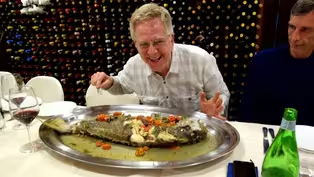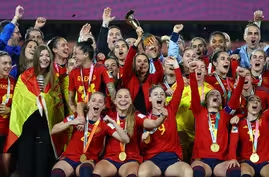
Ukrainian nonprofit helps amputees get artificial limbs
Clip: 8/20/2023 | 5m 38sVideo has Closed Captions
Ukrainian nonprofit helps amputees get artificial limbs
As the war in Ukraine rages on, a critical need has emerged, with some 20,000 to 50,000 Ukrainians forced to amputate one or more limbs. The Ukrainian nonprofit Superhuman Center is helping survivors move forward, offering reconstructive surgery and physical and psychological support. Co-founder Andrey Stavnitser joined Nick Schifrin to discuss.
Problems playing video? | Closed Captioning Feedback
Problems playing video? | Closed Captioning Feedback
Major corporate funding for the PBS News Hour is provided by BDO, BNSF, Consumer Cellular, American Cruise Lines, and Raymond James. Funding for the PBS NewsHour Weekend is provided by...

Ukrainian nonprofit helps amputees get artificial limbs
Clip: 8/20/2023 | 5m 38sVideo has Closed Captions
As the war in Ukraine rages on, a critical need has emerged, with some 20,000 to 50,000 Ukrainians forced to amputate one or more limbs. The Ukrainian nonprofit Superhuman Center is helping survivors move forward, offering reconstructive surgery and physical and psychological support. Co-founder Andrey Stavnitser joined Nick Schifrin to discuss.
Problems playing video? | Closed Captioning Feedback
How to Watch PBS News Hour
PBS News Hour is available to stream on pbs.org and the free PBS App, available on iPhone, Apple TV, Android TV, Android smartphones, Amazon Fire TV, Amazon Fire Tablet, Roku, Samsung Smart TV, and Vizio.
Providing Support for PBS.org
Learn Moreabout PBS online sponsorshipJOHN YANG: The war in Ukraine has reached a grim milestone as many as 120,000 Ukrainians have been wounded and close to 70,000 killed.
As the conflict rages on, a critical need as emerge for some of those wounded on the front lines access to artificial limbs.
Nick Schifrin reports on a Ukrainian nonprofit that helps survivors move forward after a life changing injuries.
NICK SCHIFRIN: It is the largest land war the world has seen in 80 years and Russia has built an 800 mile long defensive line that includes massive fields of mines, some 20,000 to 50,000 Ukrainians have been seriously hurt and forced to amputate one or more limbs since the Russian full scale invasion last February.
That numbers surpasses levels not seen since World War I.
The Ukrainian group superhuman center is trying to answer the massive need for medical attention, offering reconstructive surgery and physical and psychological support to those who have lost limbs.
Andrey Stavnitser is the co-founder and joins me now.
How massive is this challenge and has it increased in the last few months as Ukraine has gone on the counter offensive through those Russian minefields.
ANDREY STAVNITSER, Co-Founder Superhumans Center: So just for your understanding, we have approximately the size of Austria, land plot size of Austria is filled with mines right now in Ukraine.
So even if the war stops today, it's going to take many months, if not years to demine it.
And we see civilians and military personnel stepping on those mines every day and about 30,000, more than 30,000 people are waiting for prosthetics right now, that means they have lost at least one limb.
So the situation is getting really bad day after day.
NICK SCHIFRIN: And you mentioned it's both civilians and soldiers for those soldiers.
Are you seeing a dramatic increase because of the nature of how the Russian defenses have been built?
And the fact that Ukrainian soldiers simply have to go through the minefield in order to get to the Russian forces that have occupied your land?
ANDREY STAVNITSER: Exactly.
So we are in the middle of the counter offensive.
And we're losing a lot of great guys.
And we're really, really waiting for the F-60s to back us up from the skies, and that hopefully is going to change the course of the war.
But meanwhile, what Superhumans is doing is we're trying to save as many victims of war so we don't distinguish between civilians or military or kids does matter for us.
And we try to provide them with the best prosthetic solutions there are.
We do it totally free of charge, thanks to our donors from all over the world, and especially from the US.
NICK SCHIFRIN: Russia has systematically targeted the Ukrainian health care system.
The organization Physicians for Human Rights now says 1,000 facilities have been targeted.
What are the barriers?
What are the challenges within the system already, that these victims who are losing limbs face.
ANDREY STAVNITSER: So the biggest issue was to create the ecosystem to bring the expertise into the country, the expertise of, you know, prosthetics, and it's not only prosthetics, it's also, you know, psychological, physiological rehabilitation, its production of prosthetics, installation and maintenance has to come as a package because, you know, these people they need complex, holistic solutions.
Our main goal is to put them back to work to make them able to perform in the office or whatever they would be doing before.
For example, we have a patient who is ice skating instructor.
So, we have produced and ice skating prosthetics so that he can go back to training kids, you know, we're doing figure skating.
NICK SCHIFRIN: Does that mean that every person who comes to you at least needs a tailor made prosthetic and how difficult is that?
ANDREY STAVNITSER: It is quite difficult, your prosthesis is point of contact for the rest of your life.
Because whenever you lose a little bit of weight, or you gain a bit of weight, or something happened to you, you have to come and adjust your prosthetic slightly starts causing trouble, it starts causing pain.
So you have to make sure that it's always fitting you in the best possible way.
So you can be verticalized and you can do sports, and you can be active, et cetera.
So it's a complex thing, and Ukraine never had it.
So we had to bring all this expertise.
We had to teach our doctors abroad and bring them in where to find us, U.K., German doctors, bring them into Ukraine so that they could train as many doctors in Ukraine who could then go and work across the country.
NICK SCHIFRIN: You currently have one facility in Lviv, the largest city in western Ukraine.
You're hoping to open five facilities in the next two years.
Are you concerned that the need for what you do is only going to increase as this war continues?
ANDREY STAVNITSER: We're trying to be ready for that.
And you know, I was -- before the war started I thought million dollars is a lot of money but right now I can see that a million dollars is only 50 patients for Superhumans.
Our biggest bottleneck right now is that we need more financing in order to bring help to more people.
We're obviously blessed with donors.
But this is not enough.
The amount of people that need help is much bigger than any of our current donors.
NICK SCHIFRIN: Andrey Stavnitser is the co-founder of the Superhuman Center.
Thank you very much.
ANDREY STAVNITSER: Thank you, Nick.
Travel writer Rick Steves' advice on post-pandemic travel
Video has Closed Captions
Clip: 8/20/2023 | 5m 52s | Travel writer Rick Steves shares advice on navigating post-pandemic travel (5m 52s)
What Spain’s win means for the future of women’s soccer
Video has Closed Captions
Clip: 8/20/2023 | 6m 21s | With Spain’s historic win, a look at the progress and challenges facing women’s soccer (6m 21s)
Providing Support for PBS.org
Learn Moreabout PBS online sponsorship
- News and Public Affairs

FRONTLINE is investigative journalism that questions, explains and changes our world.

- News and Public Affairs

Amanpour and Company features conversations with leaders and decision makers.












Support for PBS provided by:
Major corporate funding for the PBS News Hour is provided by BDO, BNSF, Consumer Cellular, American Cruise Lines, and Raymond James. Funding for the PBS NewsHour Weekend is provided by...

